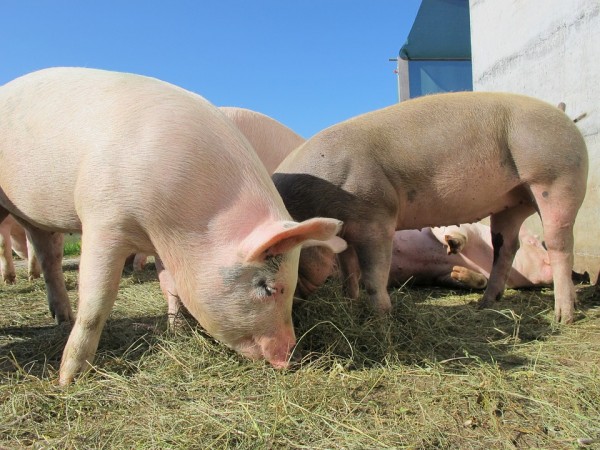By Ana Verayo, | November 16, 2016

"There are striking similarities between pigs and humans, for example our DNA and digestive track,” says Courtney Stanton, vice president of the Bioscience Group for Smithfield
A new study has revealed that pigs apparently have moods, ranging from being positive to negative.
Similar to humans, there are pigs with optimistic and bubbly personalities while others can be moody and brooding, according to scientists.
Like Us on Facebook
A research team from the University of Lincoln in England studied 36 domestic pigs. Some of them were placed in more comfortable living conditions with more space and plenty of straw to keep them warm.
Scientists were able to investigate the mood of the pigs by giving them food bowls in two separate locations. One bowl contains sugar coated chocolates while the other was filled with just plain coffee beans.
The results revealed that pigs that are proactive and more optimistic are more curious. They are also more likely to investigate both locations, checking if a bowl may or may not contain delicious chocolates. This also suggests that these pigs always look on the bright side and they can adjust to any environment they live in.
However, those moody pigs with less straw and living space are more prone to be pessimistic and have a negative outlook, but they tend to lighten up when their home conditions improved.
According to the author of the study, Lisa Collins of the University of Lincoln, reactive pigs in a less enriched environment are more pessimistic compared to those that live in a more enriched environment, making them more optimistic.
This new study revealed that mammals could be similar to humans in terms of judgment as they incorporate stable personality traits and transient mood states.
These new findings have been detailed in the journal, Royal Society journal Biology Letters.
-
Use of Coronavirus Pandemic Drones Raises Privacy Concerns: Drones Spread Fear, Local Officials Say

-
Coronavirus Hampers The Delivery Of Lockheed Martin F-35 Stealth Fighters For 2020

-
Instagram Speeds Up Plans to Add Account Memorialization Feature Due to COVID-19 Deaths

-
NASA: Perseverance Plans to Bring 'Mars Rock' to Earth in 2031

-
600 Dead And 3,000 In The Hospital as Iranians Believed Drinking High-Concentrations of Alcohol Can Cure The Coronavirus

-
600 Dead And 3,000 In The Hospital as Iranians Believed Drinking High-Concentrations of Alcohol Can Cure The Coronavirus

-
COVID-19: Doctors, Nurses Use Virtual Reality to Learn New Skills in Treating Coronavirus Patients







